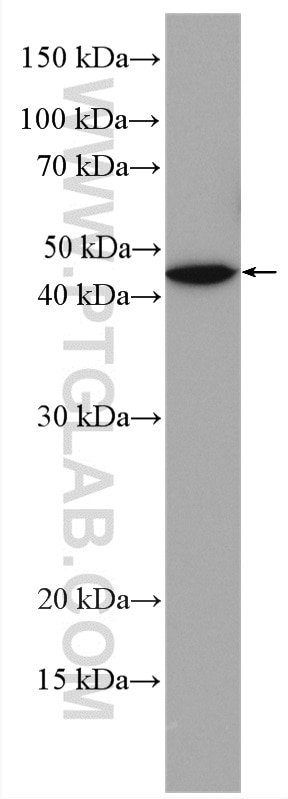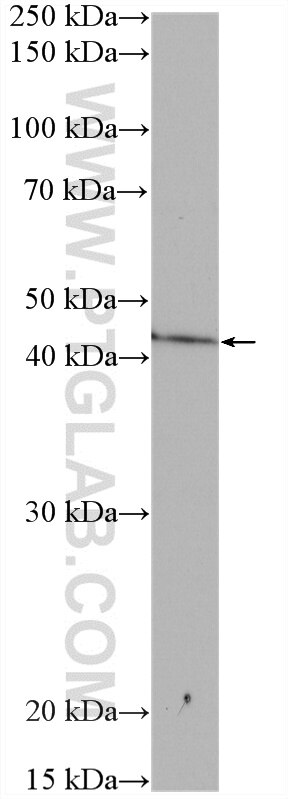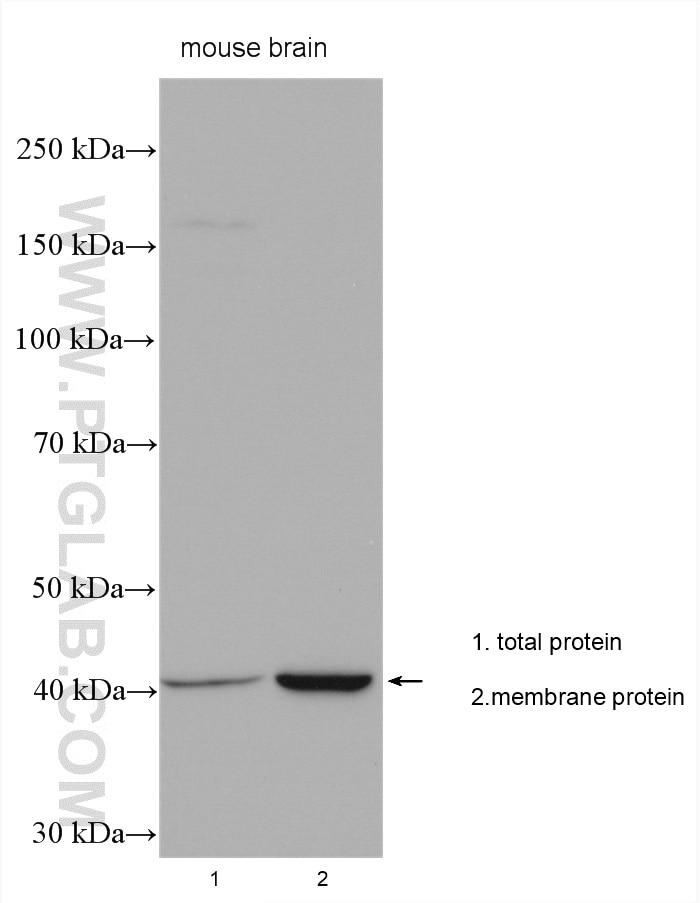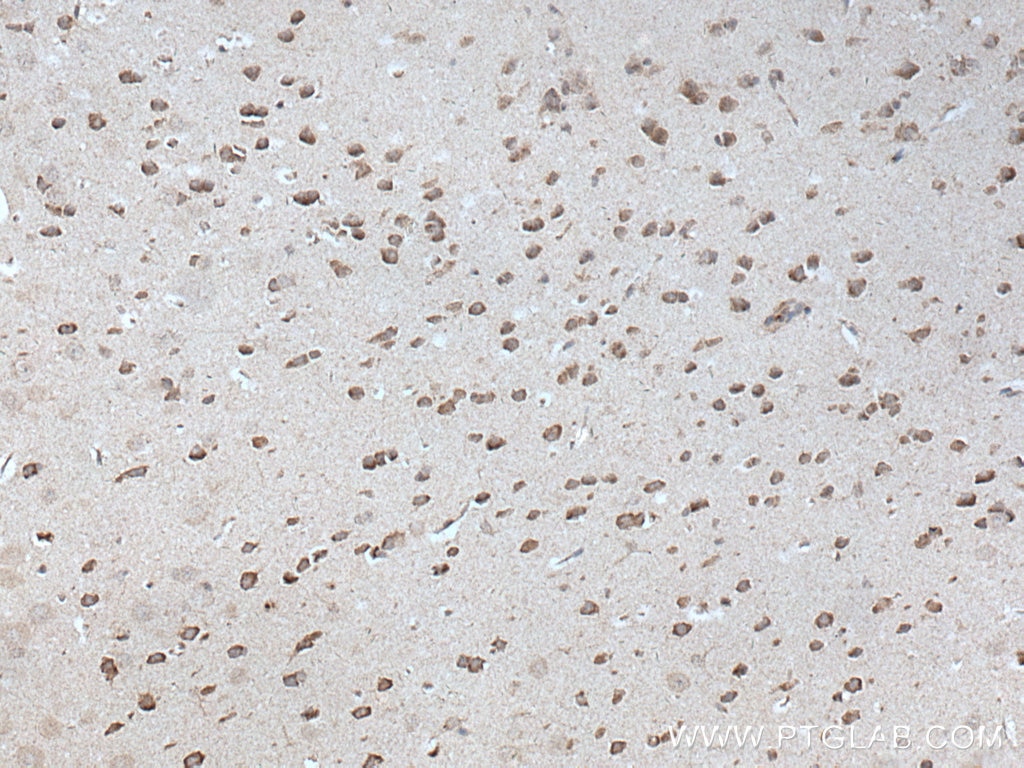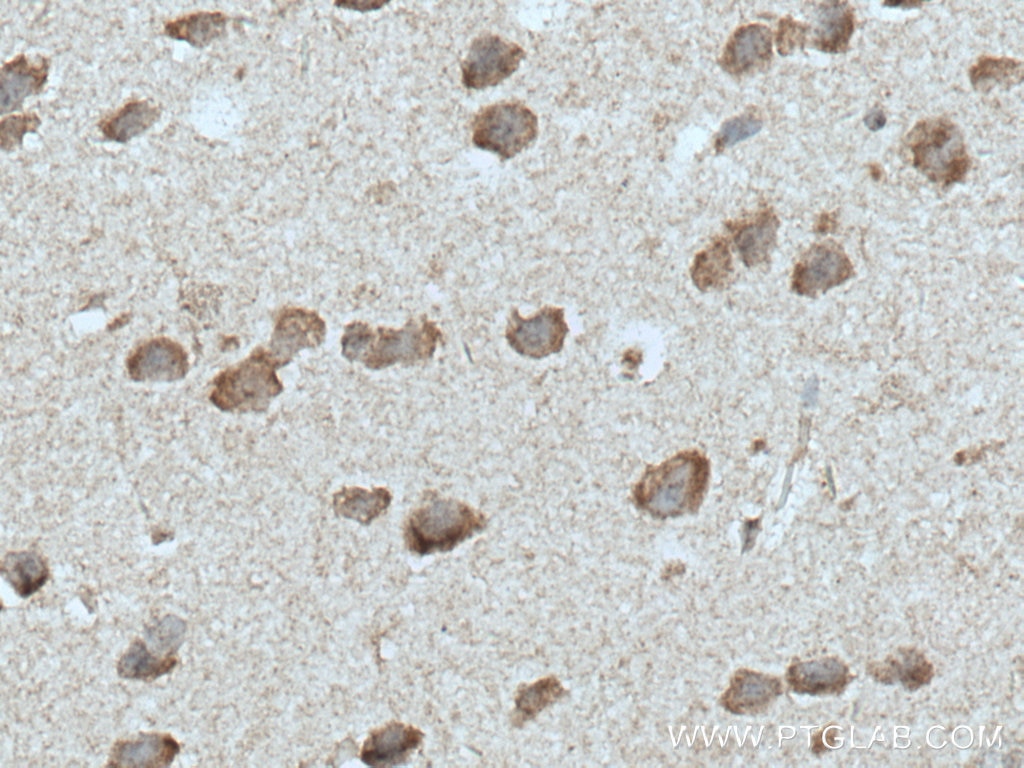Anticorps Polyclonal de lapin anti-ADORA2A
ADORA2A Polyclonal Antibody for WB, IHC, ELISA
Hôte / Isotype
Lapin / IgG
Réactivité testée
Humain, rat, souris
Applications
WB, IHC, ELISA
Conjugaison
Non conjugué
N° de cat : 51092-1-AP
Synonymes
Galerie de données de validation
Applications testées
| Résultats positifs en WB | tissu cérébral de souris, tissu cérébral de rat |
| Résultats positifs en IHC | tissu cérébral de souris, il est suggéré de démasquer l'antigène avec un tampon de TE buffer pH 9.0; (*) À défaut, 'le démasquage de l'antigène peut être 'effectué avec un tampon citrate pH 6,0. |
Dilution recommandée
| Application | Dilution |
|---|---|
| Western Blot (WB) | WB : 1:200-1:1000 |
| Immunohistochimie (IHC) | IHC : 1:50-1:500 |
| It is recommended that this reagent should be titrated in each testing system to obtain optimal results. | |
| Sample-dependent, check data in validation data gallery | |
Applications publiées
| WB | See 6 publications below |
| IHC | See 2 publications below |
Informations sur le produit
51092-1-AP cible ADORA2A dans les applications de WB, IHC, ELISA et montre une réactivité avec des échantillons Humain, rat, souris
| Réactivité | Humain, rat, souris |
| Réactivité citée | rat, Humain, souris |
| Hôte / Isotype | Lapin / IgG |
| Clonalité | Polyclonal |
| Type | Anticorps |
| Immunogène | ADORA2A Protéine recombinante Ag0470 |
| Nom complet | adenosine A2a receptor |
| Masse moléculaire calculée | 412 aa, 45 kDa |
| Poids moléculaire observé | 40-45 kDa |
| Numéro d’acquisition GenBank | BC013780 |
| Symbole du gène | ADORA2A |
| Identification du gène (NCBI) | 135 |
| Conjugaison | Non conjugué |
| Forme | Liquide |
| Méthode de purification | Purification par affinité contre l'antigène |
| Tampon de stockage | PBS with 0.02% sodium azide and 50% glycerol |
| Conditions de stockage | Stocker à -20°C. Stable pendant un an après l'expédition. L'aliquotage n'est pas nécessaire pour le stockage à -20oC Les 20ul contiennent 0,1% de BSA. |
Informations générales
Adenosine (ADO) is a retaliatory metabolite that is expressed in conditions of injury or stress. Its physiological functions are mediated through interaction with four specific transmembrane receptors called ADORA1, ADORA2A, ADORA2B, and ADORA3 (PMID:23994158). ADORA2A (adenosine A2A receptor) has been shown to dampen inflammatory responses. ADORA2A signaling has been discovered on polymorphonuclear neutrophils (PMNs) (PMID:36009485).
Protocole
| Product Specific Protocols | |
|---|---|
| WB protocol for ADORA2A antibody 51092-1-AP | Download protocol |
| IHC protocol for ADORA2A antibody 51092-1-AP | Download protocol |
| Standard Protocols | |
|---|---|
| Click here to view our Standard Protocols |
Publications
| Species | Application | Title |
|---|---|---|
Mol Neurobiol Ketamine counteracts sevoflurane-induced depressive-like behavior and synaptic plasticity impairments through the adenosine A2A receptor/ERK pathway in rats | ||
Pediatr Res Caffeine treatment started before injury reduces hypoxic-ischemic white-matter damage in neonatal rats by regulating phenotypic microglia polarization. | ||
Ophthalmic Res 7-Methylxanthine Influences the Behavior of ADORA2A-DRD2 Heterodimers in Human Retinal Pigment Epithelial Cells. | ||
Adv Sci (Weinh) Targeting the Negative Feedback of Adenosine-A2AR Metabolic Pathway by a Tailored Nanoinhibitor for Photothermal Immunotherapy. | ||
Sci Bull (Beijing) Purinergic signaling by TCRαβ+ double-negative T regulatory cells ameliorates liver ischemia-reperfusion injury | ||
J Sex Med Adenosine relaxes vagina smooth muscle through the cyclic guanosine monophosphate- and cyclic guanosine monophosphate-dependent pathways |
